Happy new year to all! The KoBo team wrapped up the year with a new report on transitioning to peace in northern Uganda. In addition to the report, the team also collected data in Liberia in the fall and currently a new report is in the works. The nationwide study included the participation of 4,501 adult residents about their experience and views on transitioning to peace.
Earlier this week the team released our third report on social reconstruction, transitional justice, and peace in Northern Uganda, "Transitioning to Peace: A Population-Based Survey on Attitudes About Social Reconstruction and Justice in Northern Uganda". Northern Uganda is where we first piloted KoBo, so it was exciting to return to the region to conduct another large-scale survey using the software.
Transitioning to Peace, which was intended to capture community views on matters that affect ordinary people and the recovery after twenty years of conflict, was carried out between April and May 2010 in four districts (the Acholi districts) of northern Uganda: Amuru, Gulu, Kitgum, and Pader. The findings are based on a total of 2,498 interviews with adults in various locations, including home villages, resettlement sites, and former camps. Read the full report here: The John D. and Catherine T. MacArthur Foundation, who generously supported "Building Peace, Seeking Justice: A Population-Based Survey on Attitudes about Accountability and Social Reconstruction in the Central African Republic", recently produced a video about our work. Check it out: The research team spent a few months in the Central African Republic this past fall to gather data for a report to be published later this year. Below is a brief collection of photos from their trip. With a project this ambitious, it is helpful to know that we don't have to start from scratch. There are lots of other people trying to get to the same place as we are, and we'll all get there faster if we work together.
When we started looking into other projects that were similar in intention and design to the application we were envisioning at the Human Rights Center, it became clear that there was a wealth of people trying to do the same thing. In the spirit of cooperation, many of these were open source projects. A lot of these ideas are based upon one good idea, an extension of XML called Xforms. In short, this is a way of standardizing the way we create forms for computers, how we display them, and how we fill them out. Xforms alone is just a standard though. It's benefit is in providing a foundation to build on. This brings us to JavaRosa. JavaRosa is pretty close to what we are trying to do. It is a package for collecting data on mobile phones, and it is based on Xforms. However, it is aimed at lower powered phones, and simpler data. We are trying to collect data that is more robust, including GPS coordinates, and multi-media. Episurveyor from Datadyne is a very excellent package for mobile data collection, it is based on JavaRosa but it has many more features. It is however, limited to the Palm phone platform. This brings us to The Open Data Kit, a javarosa implementation for Android phones. ODK is a suite of data collection tools that runs on Google Android phones. It's completely open, its easy to modify, and because it is open source, the Human Rights Center can sutomize the software to fit our needs. Using the Open Data Kit, it is possible to create forms in XML. This is a graphical example of what such a form looks like on an android phone. (please note: these screenshots are taken from the emulator) The form is simple, there is one question per screen, movement is controlled by sliding the finger across the touchscreen. Each question will allow only one answer. 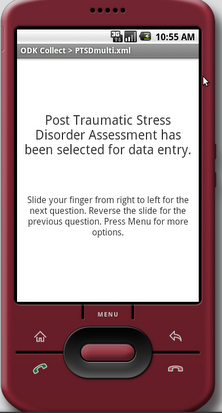 The Post Traumatic Stress Disorder Assessment is a standard set of questions used in many social science surveys. It asks a person to rate a series of situations on a sliding scale. 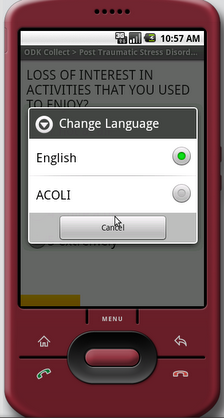 It is possible to change languages on the fly. In this screenshot, you can see the available languages are English and Acholi. You can change language at any time, the data that gets stored is the same regardless of the form's language. 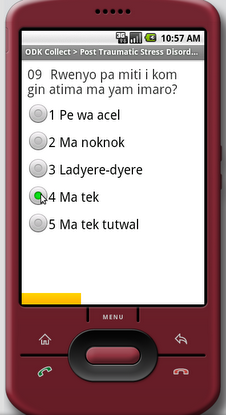 One of the PTSD questions shown here in Acholi. 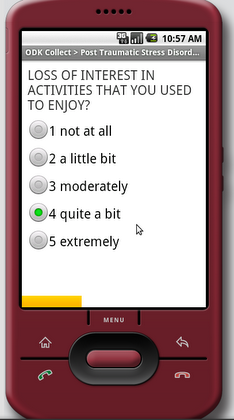 The same question shown below in English. Note that the scalar labels are also language specific. |
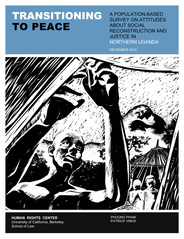
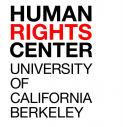
 RSS Feed
RSS Feed